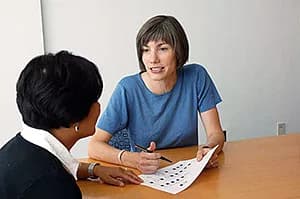
Non-Invasive Prenatal Screening's Popularity On The Rise
Genetic counselors are playing a greater role in areas of medicine in the wake of advancement in genomic technology. In the last decade, genetic testing has improved dramatically, enabling medical professionals the ability to screen for common genetic conditions like Down syndrome more accurately beginning at 10 weeks gestation.
"One of the most exciting advances in genetic testing has been the introduction of a new test called non-invasive prenatal screening, or cell-free fetal DNA (cffDNA) screening," said Martha Dudek, M.S., LCGC, a genetic counselor and senior associate in Obstetrics and Gynecology at Vanderbilt. "Initially targeted for the high-risk pregnancy population, the screening is now more widely available to all women in pregnancy.
"Now that more women in the average risk population are utilizing this screening, it is having a wider impact. It has improved accuracy over the traditional screening, which used biochemical markers."
According to Frank Boehm, M.D., professor of Obstetrics and Gynecology, the past 50 years in medicine has seen incredible pharmaceutical and technological advances to help diagnose and treat medical conditions. He expects the field of genetics to experience similar progress in the next half-century, and points to the newest non-invasive testing as a start.
"The new blood test that tests cell-free fetal DNA in pregnant patients is one of these new advances that will grow over time in our ability to detect fetal conditions and diseases," Boehm said. "We are excited to be able to offer patients a simple blood test that will reduce risk of invasive procedures as well as being able to reassure a large number of patients on the condition of their unborn child."
Dudek, director of Obstetrical Genetic Counseling, pointed to the decreased cost of cffDNA testing, which has experienced a significant drop, and the increase in insurers providing coverage of the new technology as the reasons for the growth in access.
The blood test is able to analyze genetic information detected in the mother's blood that can estimate the risk for a few common chromosome abnormalities. The new testing can reduce the need for invasive procedures like amniocentesis or chorionic villus sampling, which carry slight risks of miscarriage. Currently the panel includes a screening for trisomy 21, 13 and 18, as well as the ability to determine gender, which can also reveal sex chromosome abnormalities like Turner and Klinefelter syndromes.
Dudek cautions that the blood tests are strictly for screening purposes and cannot serve as a diagnostic tool; nor does it screen for all genetic conditions or birth defects.
"It has the potential for looking for other changes in the amount of chromosomal material that can determine other genetic chromosome problems like duplication or deletion syndrome," Dudek said. "The non-invasive screening is optional. If the screening determines a high-risk result, then further testing is discussed."
Dudek said the cffDNA test has a less than 1 percent false positive rate.
At Vanderbilt, genetic counselors meet with each patient to discuss the screening process prior to ordering the test.
"Our hope is that patients who want the information have access to it, and by providing a more accurate test we can decrease the number of invasive procedures while also decreasing the number of false positives associated with previous genetic tests," Dudek said. "The screening also allows more patients to have more time to be better prepared if there is an abnormality. Studies have shown that advance knowledge also gives the mother a better birthing experience and affords the baby a better start."
Materials provided by Vanderbilt University Medical Center. Original written by Jessica Pasley. Note: Content may be edited for style and length.
Disclaimer: DoveMed is not responsible for the accuracy of the adapted version of news releases posted to DoveMed by contributing universities and institutions.
Related Articles
Test Your Knowledge
Asked by users
Related Centers
Related Specialties
Related Physicians
Related Procedures
Related Resources
Join DoveHubs
and connect with fellow professionals

0 Comments
Please log in to post a comment.